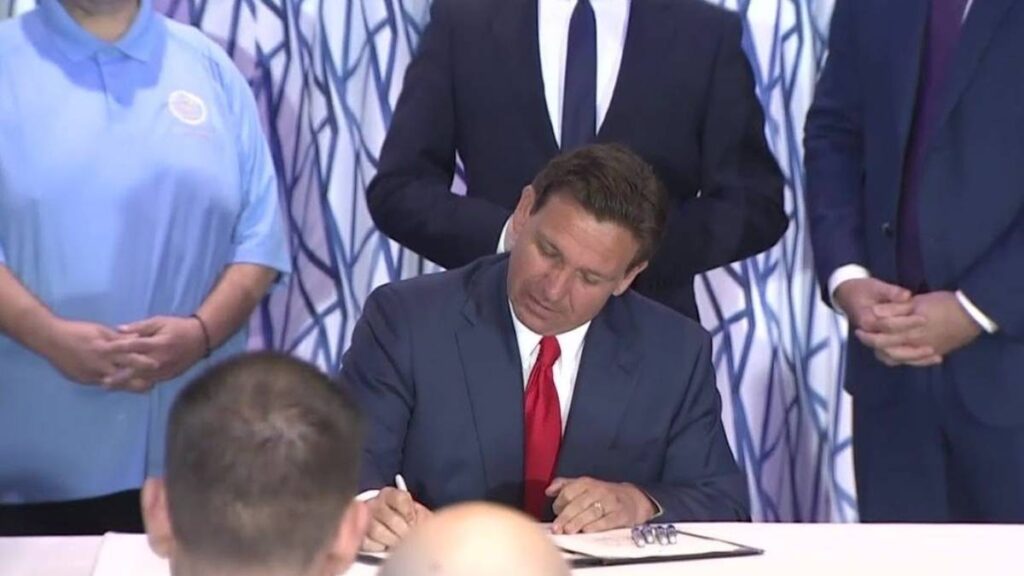Governor Ron DeSantis of Florida signed a Bill this week. The bill’s purpose is to prohibit homeless people from sleeping on streets, sidewalks, and parks. DeSantis framed the legislation as a “law-and-order” measure to assist unhoused residents. Additionally, the law promises to provide homeless people with increased access to services.
It will also address issues such as substance abuse and mental health problems. Proponents of the bill argue that it is necessary to maintain public order and safety. “Florida will not allow homeless encampments to intrude on its citizens or undermine their quality of life,” Gov. DeSantis said in a statement.
They cite concerns about the effect of homelessness on businesses, tourism, and quality of life in urban areas. Supporters argue that allowing homeless people to sleep in public spaces contributes to disorderliness, sanitation issues, and potential risks to both the homeless and the general public.
The new law is set to take effect on October 1st. The state Department of Children and Families will supervise local governments in establishing designated areas for homeless individuals to camp for up to a year. However, those using these encampments will be prohibited from consuming alcohol or illegal drugs.
ALSO READ: Florida Set to Ban Homeless People From Sleeping on Public Property
The law also mandates that sanitation and security services be provided at these sites. According to a news release from the governor’s office, the encampments would be established if local homeless shelters reach maximum capacity.
The law mandates that regional entities must provide behavioral treatment access as a condition for a county or city to create an encampment. During the Legislature’s latest session, Florida’s homeless population was estimated to be about 30,700 in 2023. This figure represents a portion of the homeless population in many large U.S. cities.
POLL—Should the Government Increase Taxes on the Wealthy To Reduce Economic Inequality?
Florida ranks as the state with the third-highest share of homeless residents in the United States, trailing behind California and New York. However, the rate of homelessness is lower than the national average, with about 14 homeless people for every 10,000 Florida residents.
Sponsors of the bill have expressed concerns that the situation could worsen due to Florida’s rapid population growth. “With a challenge as complex as chronic homelessness, it is all too easy to fall into the trap of comfortable inaction,” Rep. Sam Garrison said in the governor’s office’s statement.
“This bill will not eliminate homelessness. But it is a start. And it states clearly that in Florida, our public spaces are worth fighting for.” However, some homelessness advocates cautioned that it may prove ineffective. They believe that the intention of the bill is to round up homeless individuals and hide them from public view.
ALSO READ: Newsom Backtracks on Tiny Home Plan, Leaves Cities With Funding Challenges
“This bill does not, and it will not address the more pressing and root cause of homelessness,” said Democratic state Sen. Shevrin Jones during a debate this year. “We are literally reshuffling the visibility of unhoused individuals with no exit strategy for people who are experiencing homelessness.”
DeSantis on the other hand believes the bill is different because it promises to offer the services homeless people often need. “This is going to require that the services are there to help people get back on their feet. I think it’s important that we maintain the quality of life for the citizens of Florida,” the governor emphasized.
You Might Also Like:
Court Sentences Two Mississippi Officers for Torture of Black Men
Trump Campaign to Merge With RNC Ahead of Presidential Elections
TikTok User Calls Out Store for Forceful Tipping Culture
Unknown Menu Items From Your Favorite Restaurants
Uber, Lyft Rideshare Drivers Strike Over Dramatic Pay Decrease
